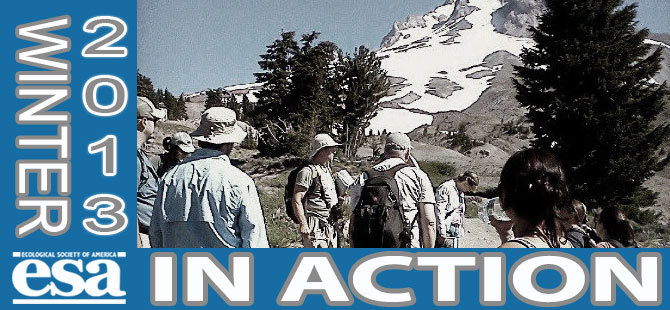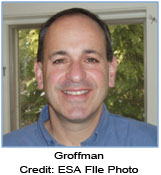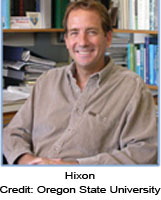
ESA ANNOUNCES 2013 GSPA RECIPIENTS
 |
ESA supports young ecologists’ interest in policy through the Society’s annual Graduate Student Policy Award (GSPA). The competitive award brings graduate students to the nation’s capital to participate in two days of science policy activities, including meetings with congressional offices and briefings with policy experts on how current political and fiscal issues may impact the work of federal agencies and support of ecological research.
Since 2007, over 20 ESA graduate students have received the GSPA. Some have gone on to careers that routinely involve policy or public outreach while others have obtained Fellowships through the American Association for the Advancement of Science to work for agencies such as the National Oceanic and Atmospheric Administration and the Forest Service.
ESA’S 2013 Graduate Student Policy Award recipients are Matt Berg (Texas A&M University), Lindsay Deel (West Virginia University), Caitlin McDonough MacKenzie (Boston University) and Carlos Silva (University of Maryland).
The four students will participate in policy training sessions as well as meetings with decision-makers on Capitol Hill on April 10 and 11. The event is sponsored by the Biological Ecological Sciences Coalition, co-chaired by ESA. Additional information on the award recipients is available here.
JOINT LETTER TO OBAMA REQUESTS CLIMATE SUMMIT
ESA joined the Society for Conservation Biology, the American Meteorological Society and three other scientific societies in a letter to President Obama requesting that the White House convene a national summit on climate change. “A considerable number of organizations have now called for a climate change summit and the recent draft report of the National Climate Assessment underscores the need for high-level attention to this issue,” said the letter. Numerous media outlets reported on the communication, including The Hill, E&E Daily, and climatecentral.org which ended with a quote from ESA’s president: "We're ready to help," said Scott Collins, president of the Ecological Society of America and a professor at the University of New Mexico. "Just let us know what [we] can do." Click here to view the joint letter.
PRESERVING FEDERAL INVESTMENT IN SCIENCE
Over the past year, ESA has been involved in efforts to prevent significant cuts to federal discretionary spending programs, largely through its participation in activities coordinated by NDD United, a coalition of organizations that represent a broad swath of non-defense discretionary spending areas including healthcare, education and science.
These efforts have included action alerts urging members to contact their congressional delegation about the proposed cuts as well as several letters addressed to the president and congressional leaders outlining the impacts sequestration would have on research and environmental programs.
In November, ESA spearheaded a letter to policymakers outlining the impacts of sequestration on science agencies such as the National Science Foundation, the United States Geological Survey and the National Oceanic Atmospheric Administration.
ESA also joined over 100 scientific societies and universities in signing a letter highlighting the importance of continued federal investment in science and how it benefits the US economy. Both letters note that federal discretionary spending is already on the decline and call for a balanced approach to deficit reduction that takes into account tax revenue and entitlement reform.
ESA MEMBERS IN ACTION
 PETER GROFFMAN (Cary Institute of Ecosystem Studies) published a paper in Frontiers in the Environment and Ecology that highlighted a connection between social and ecological revitalization efforts in urban communities and was also the focus of an EcoTone blogpost.
PETER GROFFMAN (Cary Institute of Ecosystem Studies) published a paper in Frontiers in the Environment and Ecology that highlighted a connection between social and ecological revitalization efforts in urban communities and was also the focus of an EcoTone blogpost.
 MARK HIXON (Oregon State University) was recently featured on the PBS program Saving the Ocean for the episode entitled “Scourge of the Lionfish.”Hixon’s National Science Foundation-sponsored field research focuses on the lionfish invasion.
MARK HIXON (Oregon State University) was recently featured on the PBS program Saving the Ocean for the episode entitled “Scourge of the Lionfish.”Hixon’s National Science Foundation-sponsored field research focuses on the lionfish invasion.
JULIAN OLDEN (University of Washington) was featured in Global Ecology and Biography and Real Clear Science for his work identifying how known invasive species can function as “avatars” in predicting where emerging invasive species may establish themselves.
Last fall STEVE ORMEROD (Cardiff University) was elected Chairman of the Royal Society for the Protection of Birds, Europe's largest wildlife non-governmental organization. As chair, Ormerod is responsible for governance and direction of a 1.1 million member organization that works to preserve threatened bird species.
 ALLISON SNOW (Ohio State University) provided the Congressional Research Service (CRS) with seminal, recent articles that address the ecological effects of Genetically Modified Organisms. CRS is putting together a review paper on the topic and had requested help from ESA.
ALLISON SNOW (Ohio State University) provided the Congressional Research Service (CRS) with seminal, recent articles that address the ecological effects of Genetically Modified Organisms. CRS is putting together a review paper on the topic and had requested help from ESA.
JANO TOPERCER (Comenius University – Bratislava) has been working with the International Mire Conservation Group, a leading international network of peatland scientists and other specialists, to preserve species and habitats of importance to the European Union in and around the Rojkov Fen Nature Reserve in the Slovak Republic.
 JUDITH WEIS (Rutgers University) was featured in an article highlighting her research on how pollution in the Hackensack River alters the eating habits of crabs and fish.
JUDITH WEIS (Rutgers University) was featured in an article highlighting her research on how pollution in the Hackensack River alters the eating habits of crabs and fish.
JOY ZEDLER (University of Wisconsin) was an invited speaker at the inauguration of South Korea’s National Institute of Ecology.
|
If your work includes sharing ecology through policy initiatives, work in your community or through media and other venues, we’d like to highlight it in future editions of ESA in Action. Send an email to ESA’s Public Affairs Office at pao@esa.org |
SUPPORT FOR SEEDS LEADERSHIP MEETING
The Mitsubishi Corporation Foundation for the Americas has awarded ESA’s Strategies for Ecology, Education, Diversity and Sustainability (SEEDS) a grant to support its Leadership Development program. The SEEDS Leadership Meeting will be held in New Orleans, Louisiana in February 2013 at Dillard University and will focus on ecological recovery and prevention of environmental disasters.
MEDIA
A new Field Talk podcast featured an interview with Erle Ellis of UMBC about geographical bias in field research.
New Issues in Ecology
ESA’s latest Issues in Ecology, Issue #16, “The role of landscape connectivity in planning and implementing conservation and restoration priorities” is available free as a pdf here. A team of researchers, managers, and ecological risk assessors review the current state-of-the-art in landscape connectivity planning, offering models, case studies, and advice for coping with the uncertainty inherent in dynamic, real-world conditions. See the press release here.
A Spanish translation of Issues in Ecology #15, “Excess Nitrogen in the U.S. Environment: Trends, Risks, and Solutions,” is now available for download here.
The November 2012 edition of Ecology showcased research showing how elk bones can be used to determine habitat preferences for the species. Author Joshua Miller used elk bones and antlers to provide a new, minimally invasive method to charter the habitat use and range of the species in Yellowstone National Park. The ESA press release is here.
Frontiers in Ecology and the Environment published a paper highlighting how human disturbance actions taken nearly a century ago can have residual impacts in marine and terrestrial habitats. The research, by Tyler Coverdale and colleagues at Brown University, narrows in on how mosquito ditches dug in Cape Cod, MA in the 1930s have exacerbated salt marsh die- off in the present day.
|
Earlier this month, Frontiers celebrated its 10th anniversary and 100 issues of the journal. Congrats and thanks to all who have helped make this ESA publication a success over the past decade! |
‘Follow’ ESA activities on Twitter, Facebook ESA’s social media reach continues to expand. Our Facebook page has reached 2200 “likes” and we currently have 6,800 followers on Twitter. Keep track of science and policy developments, news about your fellow ecologists and join the conversation through our Facebook page and twitter. |
|
Opportunities to share your insights EcoTone: ESA’s blog welcomes guest contributions. For more information, contact ESA Communications Officer, Liza Lester: llester@esa.org. Podcasts: Field Talk features the field experiences of ecologists, including the work of those who have been published in the Society’s journals. For more information, contact Liza Lester: llester@esa.org. The Ecologist Goes to Washington podcast provides a venue to communicate experiences in public policy. For more information, contact ESA Science Policy Analyst, Terence Houston: terence@esa.org. |